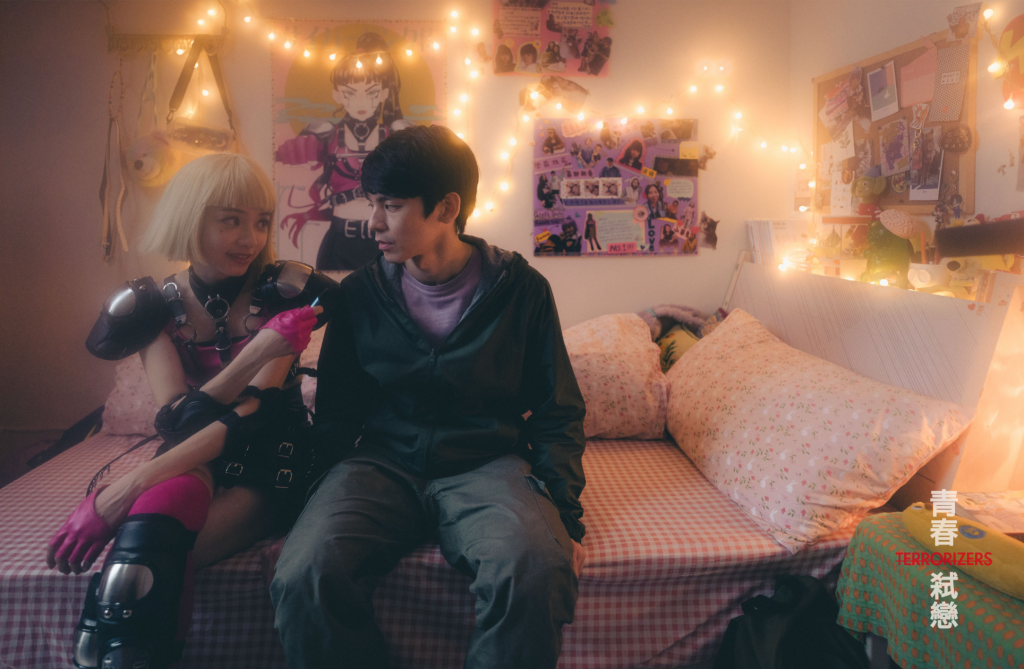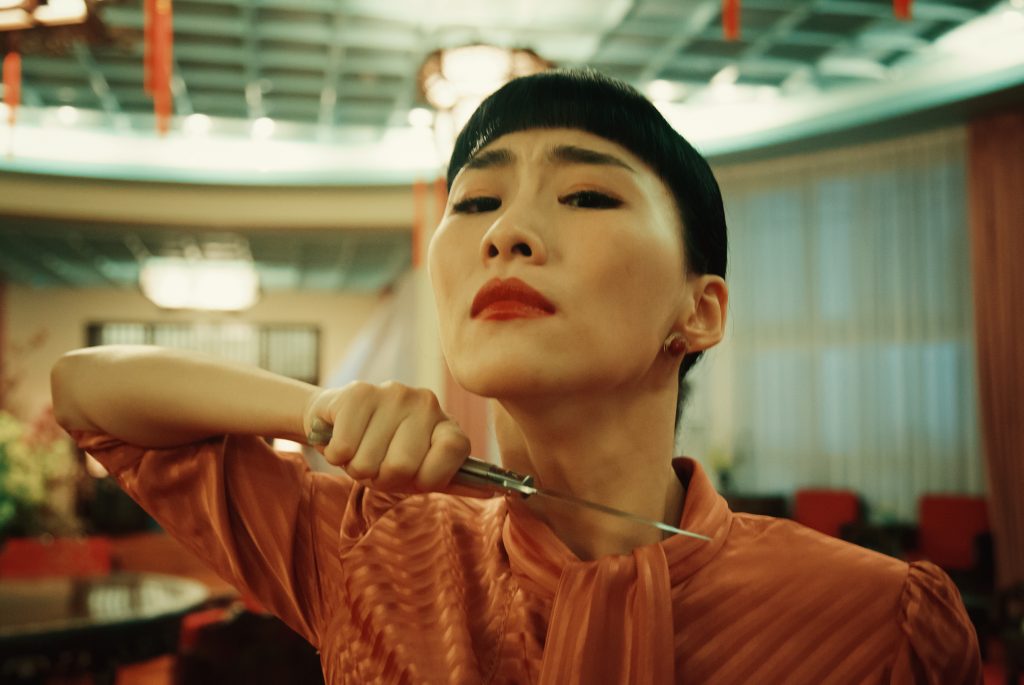September 15, 2021
by Carla Hay

“Terrorizers”
Directed by Wi Ding Ho
Mandarin with subtitles
Culture Representation: Taking place in Taipei City, Taiwan, the drama “Terrorizers” features an all-Asian cast of characters representing the working-class, middle-class and wealthy.
Culture Clash: Four people in their 20s are involved in a dangerous love quadrangle.
Culture Audience: “Terrorizers” will appeal primarily to people who are interested in compelling thrillers about emotionally damaged people and love complications.

Becoming obsessed with an unrequited love has been the topic of many stories, but the dramatic thriller “Terrorizers” (written and directed by Wi Ding Ho) takes the unusual step of presenting the fallout of this obsession from the perspectives of four people who are involved in a love quadrangle. The four people—who are all in their 20s and live in the Taiwan capital of Taipei City—are affected in one way or another by this obsession, which has become violent when one of the people in this love quadrangle goes on a public rampage and uses a samurai sword to attack.
The four people who are at the center of this complex relationship drama are:
- Ming Liang (played by Austin Lin), a troubled loner who comes from a wealthy family and who is addicted to video games.
- Yu Fang (played by Moon Lee), a shy café worker/aspiring actress who has abandonment issues stemming from her parents’ divorce, including an absentee mother and a politician father who neglects Yu Fang.
- Xiao Zhang (played by JC Lin), a romantic aspiring chef/restaurateur who currently works as a low-paid cook in a fast-food restaurant.
- Monica (played by Annie Chen), an ambitious aspiring actress whose past job as a pornographic “cam girl” continues to haunt her.
It’s revealed in the movie’s trailer and early on in the movie that Ming Liang is the one who goes on the samurai sword rampage. He dresses up as a hooded ninja and then instigates the vicious attack at a shopping mall. Most of “Terrorizers” shows what led up to this violent crime. “Terrorizers” had its world premiere at the 2021 Toronto International Film Festival.
It would be giving away too much information to say who ends up getting romantically involved in this story. However, it’s enough to say that this quadrangle includes bisexuality/queerness and at least one person who’s dating two people at the same time. Some of the scenes in the movie are repeated, but shown from the angle of a different person in the quadrangle. Each person in the quadrangle has a unique personality and psychology, which explain many of their decisions and reactions in this story.
A revealing scene with Ming Liang and his disappointed father shows that Ming Liang has a long history of anti-social rebellion. Whenever Ming Liang got in trouble in school, his father bought his way out of that trouble. Ming Liang’s parents are divorced, and it’s mentioned that Ming Liang’s mother is an alcoholic whom he hasn’t seen in years. Ming Liang is unemployed and spends much of his time alone playing video games or riding his bicycle through the city. He also has a nasty habit of being a voyeur/Peeping Tom.
Yu Fang and Monica are in a theater group together. Yu Fang is more talented than Monica, but Monica gets more auditions because she’s better-looking and more assertive than Yu Fang. Monica has used her good looks to her advantage, and she’s become accustomed to having men pay for her expenses. She often gets sexually propositioned by men who expect her to do something sexual with them in order for them to do her a favor. Monica is more than willing to consent and go along with it if she thinks what she’ll get in return is worthwhile.
However, there’s a down side to Monica relying too much on her physical appearance to have men financially support her or do other favors for her. For example, Monica recently had a nasty breakup with a live-in boyfriend named David (played by Shang Ho Huang), a photographer whose specialty is taking nude photos of women and filming women for amateur porn videos. Monica found out that David was cheating on her, so she broke up with him.
David was paying all of Monica’s living expenses. But now that they’ve broken up, she has to move out of the apartment that they shared (the apartment is in his name) and find a new place to live. The problem is that Monica is broke and doesn’t have a place where she can go. Monica apparently doesn’t have any close friends or family members who can help her.
Monica has another problem: Not that long ago, David convinced Monica to make a sex video with him when she was working as a “cam girl” under the alias Missy. The video was uploaded and sold as part of the Monica’s cam girl work. And apparently, a lot of people in the entertainment industry have seen this video, because whenever she goes on auditions, the people interviewing her (who all happen to be men) mention her Missy sex video.
Monica usually doesn’t deny that she made the video, but she seems very embarrassed every time someone mentions it to her. She always tries to change the subject when her past pornography is brought up in a conversation. And she makes it clear to anyone who talks about the video that she’s no longer doing any porn or any “cam girl” work. She wants to be taken seriously as an actress.
In contrast to Monica getting a lot of attention from men, Yu Fang feels neglected by men, specifically her father Guo (played by Tang Chih Wei), who has put his politician career above being an attentive parent. Near the beginning of the movie, Yu Fang is trying not to get depressed because she feels she’s being “abandoned” by a loved one again. She’s been living with Guo, but he’s decided to move back to his hometown of Yilan City, because he thinks it will help his current political campaign.
Guo has also gotten married to his much-younger second wife Mandy (played by Celia Chang), who is Guo’s administrative assistant and who is currently pregnant with their first child together. Guo and Mandy’s wedding is shown in the movie. The house where Yu Fang lived with her father has been sold, and time is running out for Yu Fang to get a new place to live. Yu Fang wants to stay in Taipei City because she loves being in her theater group, which is where all of her friends are.
Yu Fang has been delaying finding a new place as long as possible, but her father offers to help pay her expenses. Guo asks Yu Fang if she would consider a roommate when she finds a new place to live. And he knows someone who might be an ideal roommate because he’s the son of someone who is one of Guo’s richest donors. The name of this son is Ming Liang. Yu Fang doesn’t really like the idea because she doesn’t know Ming Liang very well.
Meanwhile, Xiao Zhang is a friendly person who’s had a secret crush on Yu Fang. He recently quit his job as a cook on a ship because life at sea got too lonely for him, and he’s ready to settle down and start a family. The fast-food restaurant where he works is owned by a couple named Mr. Yang (played by Liao Chin Liang) and Mrs. Yang (played by Huang Jie Fei), whose rebellious, cosplaying 16-year-old daughter Kiki (played by Yao Ai Ning) also works in the restaurant.
Xiao Zhang lives with his Uncle Wong (played by Yong Yi Jyun), who owns his own barber shop. Xiao Zhang and Uncle Wong live in an apartment that is directly across from another building’s apartment, where a middle-aged alcoholic masseuse named Lady Hsia (played by Ding Ning) lives and works out of her home. Lady Hsia is not Ming Liang’s mother, in case anyone thinks that’s a plot twist in the movie. However, one of the people in this relationship quadrangle ends up getting to know Lady Hsia and turns to her for emotional support.
There are parts of “Terrorizers” that resemble a soap opera, but in the best possible ways. The twist and turns to the story are intriguing, with some plot developments being less predictable than others. The only part in the movie that seems too over-the-top in its melodrama is a scene that takes place with Ming Liang and someone at a train station. But the scene could be justified as a way of showing how much Ming Liang’s mental health is deteriorating.
“Terrorizers” writer/director Wi Ding Ho knows how to adeptly bring suspense to the story, which is intended to show how one person’s actions can have ripple effects not just on those closest to that person but also to complete strangers. All of the actors give credible performances, although viewers might have different opinions on which of the four storylines is the most gripping. “Terrorizers” is ultimately a very memorable film about how people choose different ways to seek out love, cope with emotional trauma, and deal with rejection.



